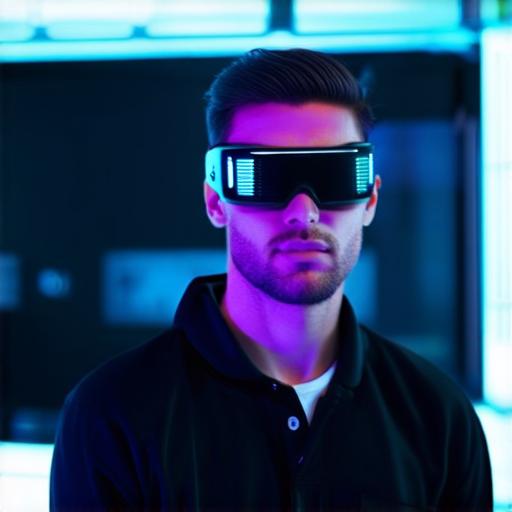Augmented reality (AR) is a rapidly growing field that combines computer science and design to create immersive digital experiences in the physical world. As AR continues to gain traction in various industries, there is an increasing demand for professionals with expertise in this technology.
Why Study Augmented Reality?
Before we dive into the top universities for studying AR, let’s first explore why it’s such an exciting field to study.
Augmented reality has a wide range of applications across various industries, including gaming, marketing, education, healthcare, and more. The technology allows for the integration of digital information into the real world, creating a more immersive and interactive experience for users. This makes AR an attractive field for professionals looking to create innovative solutions that can enhance user experiences and improve business outcomes.
Top Universities for Studying Augmented Reality
Now that we understand the benefits of studying augmented reality, let’s explore some of the top universities around the world where you can pursue your AR education.
1. Stanford University, USA
Stanford University is a renowned institution in the United States that offers a master’s degree in Computer Science with a focus on Augmented Reality and Virtual Reality. The program covers topics such as computer vision, 3D modeling, and user interaction design.

The university boasts a world-class faculty with expertise in AR and VR, including Professor John Szeliski, who is a leading researcher in the field of computer vision. Students have access to cutting-edge technology and resources, such as the Virtual Reality Lab, which features state-of-the-art VR equipment and software.
2. Massachusetts Institute of Technology (MIT), USA
The Massachusetts Institute of Technology offers a master’s degree in Computer Science with a focus on Augmented Reality and Virtual Reality. The program covers topics such as computer vision, robotics, and human-computer interaction.
MIT has a strong reputation for innovation and research in AR and VR, with faculty members such as Professor Seth Cooper, who has made significant contributions to the field of AR. Students have access to cutting-edge technology and resources, including the Computer Science and Artificial Intelligence Laboratory (CSAIL), which features advanced VR equipment and software.
3. University of British Columbia (UBC), Canada
The University of British Columbia offers a master’s degree in Computer Science with a focus on Augmented Reality and Virtual Reality. The program covers topics such as computer vision, graphics, and user interaction design.
UBC has a strong reputation for research in AR and VR, with faculty members such as Professor Dirk Paesmans, who is a leading researcher in the field of AR. Students have access to cutting-edge technology and resources, including the Computer Science Laboratory, which features advanced VR equipment and software.
4. University of California, Berkeley (UC Berkeley), USA
The University of California, Berkeley offers a master’s degree in Computer Science with a focus on Augmented Reality and Virtual Reality. The program covers topics such as computer vision, graphics, and human-computer interaction.
UC Berkeley has a strong reputation for innovation and research in AR and VR, with faculty members such as Professor Stefano Turri, who is a leading researcher in the field of AR. Students have access to cutting-edge technology and resources, including the Robotics and Human Interaction Laboratory (RHIL), which features advanced VR equipment and software.
5. University of Cambridge, UK
The University of Cambridge offers a master’s degree in Computer Science with a focus on Augmented Reality and Virtual Reality. The program covers topics such as computer vision, graphics, and human-computer interaction.
The university has a strong reputation for research in AR and VR, with faculty members such as Professor Adrian Wilkinson, who is a leading researcher in the field of AR. Students have access to cutting-edge technology and resources, including the Computer Science Laboratory, which features advanced VR equipment and software.
6. University of Tokyo, Japan
The University of Tokyo offers a master’s degree in Computer Science with a focus on Augmented Reality and Virtual Reality. The program covers topics such as computer vision, graphics, and human-computer interaction.
The university has a strong reputation for research in AR and VR, with faculty members such as Professor Yoshihiro Kawamoto, who is a leading researcher in the field of AR. Students have access to cutting-edge technology and resources, including the Computer Science Laboratory, which features advanced VR equipment and software.
7. ETH Zurich, Switzerland
ETH Zurich offers a master’s degree in Computer Science with a focus on Augmented Reality and Virtual Reality. The program covers topics such as computer vision, graphics, and human-computer interaction.
ETH Zurich has a strong reputation for innovation and research in AR and VR, with faculty members such as Professor Christian Szegedy, who is a leading researcher in the field of AR. Students have access to cutting-edge technology and resources, including the Computer Science Laboratory, which features advanced VR equipment and software.
Career Opportunities in Augmented Reality
Now that we’ve explored some of the top universities for studying augmented reality let’s take a look at some of the exciting career opportunities in this field.
1. AR/VR Developer
AR/VR developers are responsible for creating immersive digital experiences using augmented reality and virtual reality technology. They work with interdisciplinary teams to design, develop, and test AR/VR applications across various industries, including gaming, marketing, education, and healthcare.
2. UX Designer for AR/VR
UX designers for AR/VR are responsible for designing intuitive and immersive user experiences for AR/VR applications. They work closely with developers to ensure that the user experience is seamless and engaging.
3. Computer Vision Engineer
Computer vision engineers are responsible for developing algorithms and models that enable computers to interpret and understand images, videos, and other visual data. This technology is essential for creating realistic AR experiences that blend digital information with the real world.
4. Robotics Engineer
Robotics engineers are responsible for designing and building robots and other autonomous systems. They work with AR/VR developers to create interactive robotic experiences that enhance the user experience.
5. Data Scientist for AR/VR
Data scientists for AR/VR are responsible for analyzing data related to AR/VR applications, including user behavior, engagement, and performance metrics. This information is used to optimize AR/VR experiences and improve overall performance.
Conclusion
Augmented reality is a rapidly growing field with exciting career opportunities across various industries. Studying at one of the top universities for augmented reality can provide you with the skills and knowledge you need to succeed in this innovative field. Whether you’re interested in becoming an AR/VR developer, UX designer, computer vision engineer, robotics engineer, or data scientist, there are plenty of opportunities to make a difference in this exciting and rapidly evolving industry.
